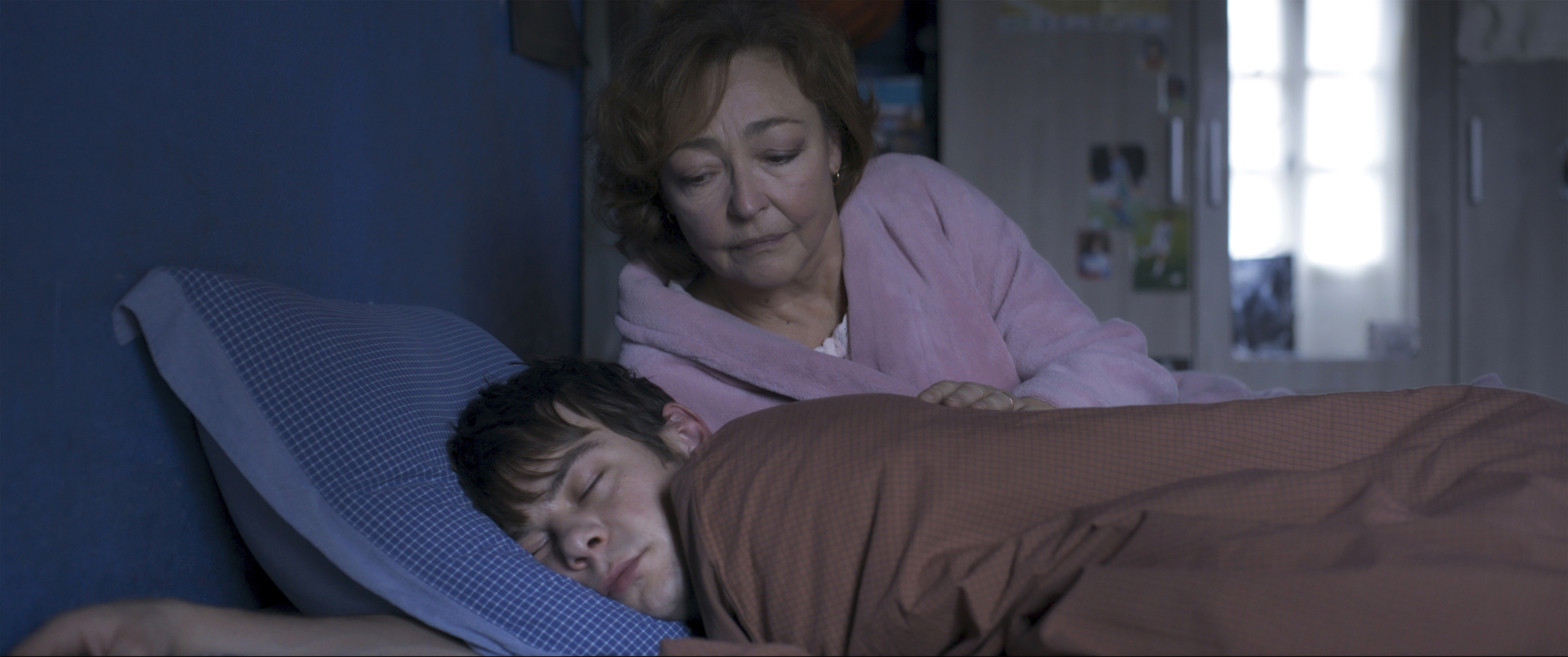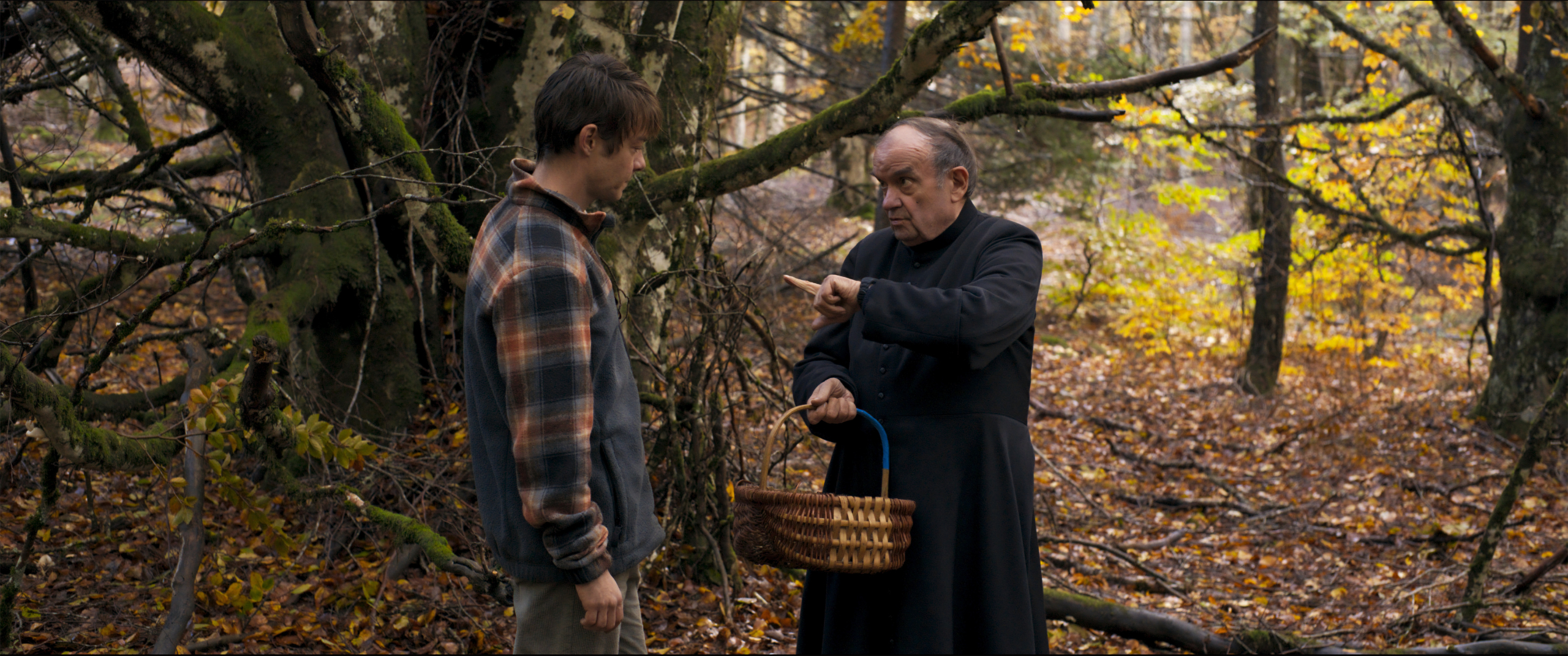Miséricorde – Desire in Landscape
What if everything around us was nothing more than desire disguised in various avatars? In “Miséricorde”, filmmaker and writer Alain Guiraudie tests the hypothesis of a universe where everything – from mushrooms sprouting after the rain to the village priest – speaks the language of pansexuality. A world, increasingly distant from our current one, but which, under Guiraudie’s fair, playful, and perverse gaze, might become ours once again.
In the early 1980s, Jean-Luc Godard asked a fundamental question: (how) can you film the back of a landscape? A question rooted in the logic of brush and canvas, to which Godard’s post-video period, crystallised around the pictorial masterpiece Passion (1982), offered many answers.
I feel a related dilemma drives Guiraudie in Miséricorde: how can one film the erection of a landscape? Guiraudie as a painter? The truth is, this already-notorious return to origins – a character who returns to their hometown, among those who once knew them; a filmmaker returning to the rural south of France after a trip to the city (the previous Viens je t’emmène, 2022) – allows us to better observe the lineage that connects Guiraudie to the impressionist touch. As early as the medium-length Du soleil pour les gueux (2001), he used the pastoral setting of sun-scorched Occitan meadows as a pretext for a visual study of shades of yellow and ochre in the surroundings.
In Miséricorde, a sudden pictorial vein emerges in harmony with the autumn air and lingering rains captured by the camera. It doesn’t disrupt the central drama but instead cloaks it in a gentle light, giving the impression of revelation. The magic of Guiraudie’s style lies in how everything floats between the most mundane concreteness and the spiritual weight of the moment, sometimes sliding from one to the other without us even realising it. We should approach this film as if it were a weather report, where the discharges of human emotions and the intensifications of nature take part in the same spectacle of desire. Latent desire, unconscious desire, frustrated desire: Guiraudie electrifies the landscape, evoking that nostalgic, even elegiac 80’s climate that sought a lost beginning and materiality for cinema, as Jacques Aumont recalls in L’œil interminable: “Godard films clouds and sunlight on water but rages against cinematographers and filmmakers who have become incapable of capturing even the most elemental aspects of air, light, water.”
It’s just that Guiraudie’s eye registers everything on the same level, an equality of presences. In his village, things are constantly communicating – it’s not a matter of uniformity, it rather has to do with the mysterious connections established between objects and beings. In one fabulous scene, the protagonist, tormented by suicidal thoughts, is caught by the village priest on the edge of a cliff. They engage in a dialogue that delves deeply into philosophical questions about the meaning of existence, all while light dances playfully across their faces following the unpredictable movements of the clouds in the vastness behind them. The moment is truly transcendental: the near-transparent discourse about the film’s central theme is joined by this sublime effect of reality and presence, this mark of transition inscribed on the very faces of the people. How can cinema still be seen as a mere technique or, conversely, a screenplay – a story? Guiraudie captures the revealed complement of the soul, and his greatness lies in the natural way he elevates to a higher plane of unreality.

How did it get there? This revenant (Félix Kysyl) attends his former boss’s funeral, then, staying overnight in the widow’s house, masturbates to a recent photo of him at the seaside. The secret of the filmmaker’s art is exposed here, halfway between the burlesque of everyday life and a singular act of desecration. What follows is a great entanglement of destinies where everyone falls asleep thinking of someone else, in a radical communion of sexual attraction. I wouldn’t have believed Guiraudie capable of Bataillean, Eros-Thanatos affects – but now repressed desire goes hand in hand with death.
Since his festival hit L’Inconnu du lac (2011), made after the jubilant, hilarious gay-picturesque romp that was Le Roi de l’évasion (2009) – for me, the pinnacle of a playful and joyful gaze – the director has said he’s in less and less of a mood to laugh. Not that this film isn’t funny: on the contrary, in a character like the dull-witted policeman who has come to placidly investigate a disappearance hiding some truly dizzying depths, Guiraudie demonstrates his art of forcing a guilty laugh to coexist with an ambient gravity. But it’s clear that the filmmaker has entered a sober, even melancholic phase, where, for the first time, desire – as critic Élodie Tamayo astutely noted – though it infuses the frame everywhere, is no longer consumed.
We should be grateful to the filmmaker for still daring to make sexuality – and especially queerness – a perfectly normal thing. Not in the sense that it’s finally been accepted by society, but rather that, in the ancient world of the southern village, the very need for discourses of legitimacy doesn’t arise. It simply exists beyond theory. Sometimes hidden, sometimes covered up – or, on the contrary, perfectly integrated into the routine and, therefore, part of the mosaic of these mundane lives. Guiraudie films timeworn, overworked faces. In Walter (David Ayala), a former acquaintance from the village with whom relations are murky, unclear, and unexplained to the end, he finds a mountain of a man with sagging flesh, his belly spilling out from under his shirt. Sexuality, here, is not the prerogative of delicate, faultless, standardised beings which cinema has accustomed us to. It blooms in the figures that films have forgotten, brought back into the light by the filmmaker’s egalitarian perversity.

With its centuries-old stone houses and slightly comical accents, Guiraudie approaches a folkloric cultural background in the same way that his films vehemently reject a certain lazy popular wisdom, such as: “Speak no ill of the dead.” Here, the dead still serve for self-pleasure. With the recurring peculiar appearance of the priest on the forest path where mushrooms grow, Miséricorde defuses the gravitas of those Bernanos adaptations epitomised by Sous le soleil de Satan (1987), a Pialat who took himself very seriously. Guiraudie, too, works with heavy themes – but wraps them in a sprightly, queer, sharp wit, protecting the film from the risk of freezing under a naturalistic mask. Beyond the trappings of a genre film – a rural noir – Miséricorde reveals itself simply as an extraordinary Alain Guiraudie film.
Miséricorde will be screened at Les Films de Cannes à Bucarest.
Title
Miséricorde
Director/ Screenwriter
Alain Guiraudie
Actors
Félix Kysyl, Jean-Baptiste Durand, David Ayala
Country
Franța
Year
2024
Film critic and journalist; writes regularly for Dilema Veche and Scena9. Doing a MA film theory programme in Paris.


